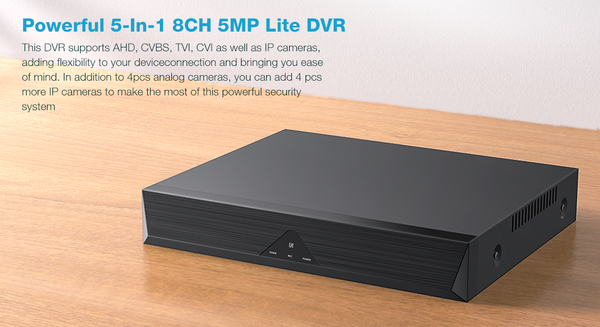Navigation
- What is a wireless home security camera?
- What are the pros and cons of wireless home security cameras?
- What is a wired home security camera?
- What are the pros and cons of wired home security cameras?
- Top Features to Consider When Buying a Home Security Camera
- Where to Buy Home Security Cameras?
Wireless cameras are now the latest trend in home security. These cameras are far more mobile than the traditional wired versions and can be placed anywhere around your property. With that being said, there are a lot of questions to ask before you decide whether or not to purchase one for your home. Find out what those questions are and what some of the advantages and disadvantages of this new technology might be in this article!
What is a wireless home security camera?
Wireless home security cameras, also known as Wi-Fi cameras. There are usually two ways, one is that the camera needs to use a socket to connect the power cord to provide power for the camera. Wireless cameras are not wireless. The other is that the camera can use wireless Internet (Wi-Fi), but it does not need to be connected to a power source, it is powered by a battery, and this is a wireless battery security camera. Wireless Battery Security Camera You need to replace the battery or charge the battery before it dies.
Wireless home security cameras often store their video files on a cloud server, so you can access them from anywhere with a phone app. Some can also store video on local media, such as SD cards in cameras. Wireless cameras are popular because they are easy to install, and it is also simple to download, playback, and view live video using a smartphone or computer.
Wireless security cameras often offer more security features. They can capture higher-resolution video, motion tracking, color night vision, two-way audio, facial recognition, and compatibility with Amazon Alexa, Google Assistant, and Apple HomeKit, among other features. Support for connected smart home systems, mobile apps, and software is relatively advanced.

What are the pros and cons of wireless home security cameras?
Advantage:
- Easier to install and adjust
- usually easier to operate
- Easy to expand and add more cameras
- Always use cloud storage, which lets you view your footage from anywhere
Disadvantage:
- There is a monthly fee for cloud storage
- limited signal range
- Walls, floors, and other architectural elements can block the signal
- May be vulnerable to hacking
Do wireless home security cameras have to have Wi-Fi?
Most wireless home security cameras wireless cameras must maintain a wifi signal and be connected to your network to record and capture video. If your wifi goes out, your wireless security camera will not be able to send information to your mobile device. However, some people can create their local wireless network that does not broadcast to the Internet. Others can store footage directly on the camera's SD card, only sending it to the cloud over Wi-Fi when you request it. Without an internet connection, the video captured by the wireless camera cannot be seen from outside the house.
Another way to connect the camera to the internet without Wi-Fi is to use a 4G cellular data security camera. It has no wifi distance limit, even if you are at the other end of the country, you can remotely view and download live video. Such as Campark SC12 3MP Outdoor Wireless 4G LTE Cellular Security Camera.

What is a wired home security camera?
A wired home security camera system, also known as a DVR (digital video recorder) security system, is a recording device that incorporates a camera. Wired security cameras transmit video and audio signals to the DVR via wires. Footage can be kept locally on the hub for later viewing, or sent to a network outside the home. The network allows users to watch videos live or watch them later. The number of cameras is usually 4 and can be up to 16. They record 24/7, can be connected to the internet for remote viewing, and are hardwired to the internet and power.
There are two types of wired home security camera systems: traditional DVR systems and newer NVR (Network Video Recorder) systems. DVR systems use coaxial cables to power cameras and record footage, while NVR systems use PoE (cables over Ethernet) to power cameras and record video. Both DVRs and NVRs can be connected to the internet via Ethernet cables.
NVRs are more advanced than DVRs and are capable of recording higher-quality video. NVRs also have some of the same features as wireless cameras, such as two-way talk and person detection. Campark SC04 3MP 100% Wireless Wifi Solar Security Camera with HDMI Output. Base stations can be used as NVRs. Events or videos will be recorded on the SD card when you insert them. Connect the camera directly to the monitor through the base station through the HDMI cable and a wired mouse, and then view the video captured by the camera in real-time on the monitor. HDMI is uncompressed for viewing native visuals in 3MP HD. You don't even need WiFi or a network to use this system!
Wired security cameras receive power through a hardwired cable. This power may come directly from an electrical outlet. Or power can be delivered via a wire connected to the DVR or NVR, with no need to plug into a power outlet. Most wired systems have an app for viewing footage on a smartphone, but you can also connect a computer monitor to the recording device to view recordings and live video.
What are the pros and cons of wired home security cameras?
Advantages:
- Reliable signal, not dropped
- Safer, no network hacking
- Clear video and audio signals
- No monthly cloud storage fees
Disadvantages:
- Difficultto install, often requires professional installation
- Not portable.
- Lengthywiring has to be done
- Mobile apps and software are often not as advanced or user-friendly
- Cannot use smart home systems like Google Assistant or Amazon Alexa

Top Features to Consider When Buying a Home Security Camera
Whether buying a wireless security camera or a wired security camera, you must consider which make and model of camera to buy. There are several factors to consider when you make this choice:
- Motion Activation: A feature where a camera should start recording and storing the video as soon as it detects motion. Keep records of suspicious people and behavior.
- Smartphone Alerts: There should be push alerts that can be sent to smartphones or tablets.
- Resolution: The higher the resolution of the video recorded by the camera, the more details you will see. Most of today's video cameras offer full HD 1080p video. Resolution cameras for Ultra HD 2K or 4K videos because they produce sharper, clearer images. Full HD is fine for most people, but if you want to get up close and zoom in on faces or license plates, look for Ultra HD or UHD with 8x or 10x digital zoom lenses.
- Night Vision: Outdoor security cameras should have night vision with a good range, and high-end security cameras also have color features to choose from. The detection range at night is not as far as during the day, and night vision ranges from about 30 feet to 300 feet.
- Audio: Two-way audio lets you hear and see what's going on, and you can talk to anyone on camera through the camera. But most only wireless cameras have this function.
- Storage: Most wireless cameras store their video in cloud servers. Most wireless cameras store video on an SD card in the camera or on a separately connected hard drive.
- Field of View: The wider the field of view, the fewer cameras need to be installed to cover the entire property. A field of view between 130° and 180° can be sought.
- Design: If you want your camera to attract the attention of potential burglars, then you can choose an outdoor camera, which can be larger in shape, more obvious, and easy to attract people's attention. Opting for a security camera with a built-in siren or floodlight can also act as an additional deterrent. If you don't want to attract any attention, you can choose an owl security camera or a light bulb security camera. Their shape is very easy to hide and not easy to be found.
- Privacy features: If you're concerned about privacy, look for a geofencing feature that turns off the camera when your smartphone is inside the house and turns it back on when you're away.
- Security Feature: Two-factor authentication is an important security feature that helps prevent hacking. This means you must use a second method (such as a phone call, email, or text message) to confirm that you are logging into your account.
- Advanced features: such as setting the active area, distinguishing between people and animals, recognizing faces, zooming, panning, etc., give you more control over what the camera captures.
- Smart Home System Compatible: The smart wireless camera can communicate with a smart home system compatible to provide you with additional functions. For example, when integrated with Amazon Alexa, Google Assistant, and Apple HomeKit smart home systems, you can use voice commands on smart speakers with screens or compatible TVs to bring up security footage, home deliveries, and more. These functions are limited to certain models of WiFi wireless cameras.
- Price: Last but not least, you need to consider the price of your security camera. You can find wireless cameras for as little as $50, like the Campark SC11 10 x Hybrid Zoom 2MP Wireless WiFi Light Bulb Security Camera.Its price is only 45.99 dollars.

Where to Buy Home Security Cameras?
Campark is committed to being the industry leader in commercial security cameras. It offers professional-grade equipment and a variety of camera options designed to meet the different needs of customers in a variety of scenarios. You can buy dome security cameras, bullet security cameras, or solar-powered security cameras. You can buy outdoor cameras, indoor cameras, and video doorbells. If you're looking for a specific camera feature, at Campark you'll almost certainly find a camera that includes it. Campark is a company you can trust, and with the widest range of security equipment to choose from, you can be sure you are getting a quality product. If you have any questions or are unclear, please feel free to contact us.
